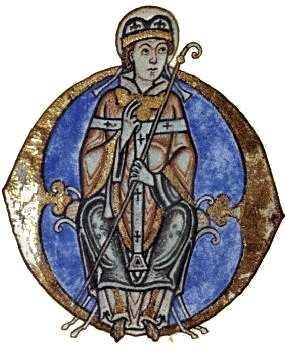Podcast: Play in new window | Download
Subscribe: Spotify | Email | RSS
 St. Anselm was the Roman Catholic archbishop of Canterbury, and an important medieval Christian philosopher. He defined the concept of God as “that than which no greater can be thought.” Using this concept, he argues that there must actually be such a being; this is his famous “ontological” argument for God’s existence. And he also deduces that this being must be eternal, and omnipotent (etc.) – otherwise, he would not be that than which no greater can be thought. Present-day philosophers call this sort of reasoning “perfect being theology.”
St. Anselm was the Roman Catholic archbishop of Canterbury, and an important medieval Christian philosopher. He defined the concept of God as “that than which no greater can be thought.” Using this concept, he argues that there must actually be such a being; this is his famous “ontological” argument for God’s existence. And he also deduces that this being must be eternal, and omnipotent (etc.) – otherwise, he would not be that than which no greater can be thought. Present-day philosophers call this sort of reasoning “perfect being theology.”
But what is the key concept? Is it the concept of the greatest being there could possibly be? Or should we argue from the concept of an absolutely perfect being? Or should we start with the concept of a being who is truly worthy of human worship?
In this episode, Dr. Mark C. Murphy, professor at Georgetown University, discusses these deep issues. He argues that the important concept for the Anselmian is absolute perfection.
Here are Dr. Murphy’s slides; it is recommended that you view this episode on youtube, as the video there syncs his slides with his talk.
You can also listen to this episode on stitcher or itunes (please rate us there). If you would like to upload audio feedback for possible inclusion in a future episode of this podcast, put the audio file here.
Links for this episode:
- Dr. Murphy’s home page
- “Does morality depend on God?” and “Why Philosophy of Religion?” Short 2013 videos by the Center for Philosophy of Religion at the University of Notre Dame
- “God and Moral Law” – Dr. Murphy’s 2012 Plantinga Fellow Lecture
- “God Beyond Justice” – Dr. Murphy’s 2012 lecture at the My Ways Are Not Your Ways conference
- God and Moral Law: On the Theistic Explanation of Morality
- Philosophy of Law: The Fundamentals
- Natural Law in Jurisprudence and Politics
- An Essay on Divine Authority
- Natural Law and Practical Rationality (kindle)
- Dr. Murphy’s papers at PhilPapers
- the philosophy of Anselm
- Dale’s introductory screencasts on two analyses of Anselm’s ontological argument
- The Society of Christian Philosophers
- Peter van Inwagen
- Yujin Nagasawa
- Jeff Speaks
- John Keller
- trinities podcast interviews with Dr. Stephen Holmes: part 1, part 2


Pingback: The 59-Second Apologist: Perfect Being Theology
Good, having established that, now we can safely proceed to the analysis of the hypothetical concept of id quo nihil maius cogitari potest. A “methodological” approach, as you say, rather than ontological, or epistemological.
Mario, nothing in this talk presupposes that Anselm’s ontological argument is cogent or sound. It’s really methodological, about perfect being theology.
@ Dale
Before spending time on Murphy’s criticism of Inwagen formulation (“not demanding enough”) or Nagasawa’s ?revisionist Anselmianism”, it would not be a bad idea to provide the caveat that Anselm’s “ontological argument” has no rational cogency whatsoever.
As already remarked here at trinities.org (with no objections from you) …
“I am not aware that Mackie [or any other ‘leading atheist, discussing the arguments at length, without the idea that Kant decisively refuted them all’ – Dale’s words] conclusively (or simply persuasively) argues against Kant’s basic objection that the existence of anything (be it God or the Fortunate Isles) cannot be the object of a necessary demonstration.” (Mario’s comments of October 14, 2014 at 9:12 am, at “podcast episode 57 – Richard Swinburne on the Trinity”)
Once you have conceded that in no way, from the hypothetical concept of id quo nihil maius cogitari potest can one deduce its existence, we can go on to examine, for instance, if the traditional divine attributes (omnipotence, omniscience, omnibenevolence …) are mutually compatible.
Comments are closed.